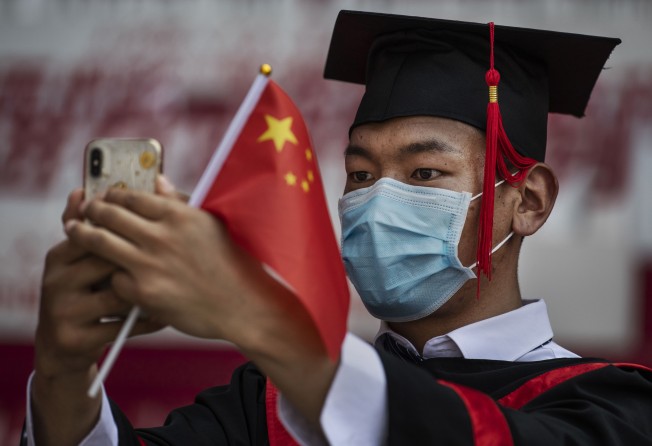
04:27
Hong Kong students prepare for university entrance exams amid latest wave of pandemic

The reported withdrawal of Beijing’s prestigious Renmin University of China (RUC) and other institutions from taking part in international university rankings has met strong support domestically, reflecting a rejection of standards defined by foreign ranking systems as the country aims to develop “world-class universities with Chinese characteristics”.
News of the university’s plans to withdraw from the rankings first spread online in early May, with national broadcaster China National Radio (CNR) citing sources familiar with the matter confirming that the university’s administrators had reached a consensus.
“[It] conforms with the overall direction of China’s education development and will become a trend,” a source said in the CNR report, adding that the withdrawal reflected the autonomy and courage of Chinese universities, education and culture.
RUC, a public research university known for humanities and social sciences, said there had been no official announcement yet and it declined to comment further.
This development comes days after a speech by Chinese President Xi Jinping at the university on April 26, in which he called for Chinese universities to “blaze a new path” instead of “blindly following others or simply copying foreign standards and models”, according to a report by Xinhua.
Besides RUC, Chinese state media reported that two other universities – Nanjing University in eastern Jiangsu province and Lanzhou University in northwestern Gansu province – had also withdrawn from all international rankings. Nanjing University did not respond to calls and email requests from the South China Morning Post, while Lanzhou University declined to comment.
Nanjing University’s Communist Party committee said in a release in April that the university “no longer considers international rankings a development target”.
In China, some of the most prominent global rankings of the world’s top universities include the QS World University Rankings, the Times Higher Education (THE) World University Rankings, the US News and World Report Best Global Universities Rankings and the Academic Ranking of World Universities (ARWU), also known as the Shanghai Ranking.
Each of these rankings is based on a different methodology, but in all research carries a lot of weight, accounting for 50 per cent of their total scores, although how this is measured also differs.
QS, US News and THE all consider university reputations based on industry surveys, while ARWU does not. Despite the teaching and learning environment being an important factor for students, only THE’s ranking factors this in, with reputation surveys, the staff-to-student ratio and institutional income contributing to the score.
Historically, these rankings have had far-reaching influence on student enrolments, teacher recruitment and resource allocation.
But education experts in China said university rankings had long been a controversial issue that required further consideration.
“Universities in China have different ideas of education compared with those abroad,” said Chu Zhaohui, a researcher at the National Institute of Education Sciences – a research arm of China’s Ministry of Education.
“The [international] evaluation standards can only provide a rough scope and framework, because different top universities have different performances.”
Chu said many influential rankings were created by private foreign institutions or media companies unfamiliar with China’s higher education environment.
Most evaluations had diverse metrics and complicated methodologies, which people outside the industry might not understand and could therefore misinterpret, he added.
None of the universities that reportedly withdrew from the international rankings were featured in the top 100 on any of the lists. Nanjing University was the closest at 101st on the ARWU ranking, while RUC and Lanzhou University’s positions varied widely across different rankings, coming in between 300th and 800th globally.
The top-ranked Chinese universities internationally are Peking University and Tsinghua University, which share 16th place on THE’s ranking this year and both were in the top 50 of the other lists.
“[RUC] plays a huge and valuable and growing role in certain fields which are not necessarily well reflected in the current ranking indicators nor underpinning data,” said Hamish Coates, a tenured professor at Tsinghua University’s Institute of Education.
It is worth noting that rankings do not always depend on universities actively taking part, so the Chinese universities’ withdrawal does not necessarily mean they will be absent from future lists.
“The US News Best Global Universities rankings do not use data collected directly from the schools themselves,” said US News & World Report chief data strategist Robert Morse. “Therefore, we will continue to rank all eligible schools in order to provide useful information for prospective students globally.”
Simona Bizzozero, communications director at QS Quacquarelli Symonds, said the QS World University Rankings had an inclusive approach when searching for data about an institution, including using official websites, surveys and other databases.
“We value and nurture engagement with all ranked universities,” Bizzozero said. “However, in the rare instance a university decides not to provide us with the data we require, we use other trusted sources.”
A source from Lanzhou University told China National Radio the university had submitted information to QS World University Rankings once when approached by the institution, but had not done so since.
Phil Baty, THE chief knowledge officer, said the organisation’s conversations with RUC were “ongoing” but he did not elaborate on whether the university would appear on future rankings. He said Lanzhou University had never featured on the ranking, while Nanjing University had completed the data submission process this year and would be ranked in the 2023 THE World University Rankings as usual.
“We will continue to provide clear, international data benchmarking for all Chinese participants,” Baty said.
ARWU did not respond to requests for comment by publication time.
Chu said withdrawing from international rankings did not mean Chinese universities should disregard all evaluations. Instead, universities should downplay the rankings but promote more comprehensive and diverse criteria.
“Universities across the globe are interconnected, and evaluations can also refer to each other,” Chu said, adding that China could not develop an evaluation system of its own behind closed doors. “To really build a first-class university, it must be beyond national borders.”
China’s central government launched a Double World Class (DWC) project in 2015 to promote the construction of “world-class universities” by offering funds to a group of the nation’s elite universities to develop expertise in certain academic disciplines.
The scheme has seen mainland universities steadily improve in global university rankings, notably through a massive increase in the volume of research. In 2019, China overtook the United States in terms of most-cited scientific studies.
“China boasts a truly global research footprint that sees significant growth year on year and is Asia’s top producer of academic papers on average,” said Bizzozero, adding that this was a sign that significant government investment in research and development was reaping rewards in research impact.
In February, Chinese ministries revealed expanded plans to lift the country’s universities to world-class level, listing 147 universities and more than 300 of their disciplines, from science and engineering to social sciences, that it said should be developed to become “first-class”.
The ministries said the goals were to develop top talent for the country, boost China’s competitiveness internationally, serve national strategic needs and encourage cross-disciplinary research, with the government set to increase investment in scientific and new cross-disciplinary subjects.
While the DWC project indicates China has not given up on its ambitions to be recognised globally as an education hub, recent developments suggest it is turning away from international rankings as a measure of success, instead aiming to set its own standards.
“A key feature of the DWC is that it encourages university differentiation,” Coates said. “One might guess, therefore, that future ‘rankings’ will see many more forms of institutional performance lists as they each seek to display their own unique value.”
In 2020, RUC established its own centre to evaluate higher education in what it said was “weak international discourse power in education evaluation, unreasonable domestic higher education evaluation standards and lack of humanities and social science evaluation indicators,” according to its website.
The RUC centre aims to evaluate higher education with Chinese characteristics and an international perspective, and answer key questions such as how a “world-class university” is defined, measured and built.
“The experts at Renmin and beyond may well have a view on an alternative and much more compelling suite of data which better convey the contribution of the university,” Coates said.
Coates said multiple forms of excellence should be taken into consideration, including the learning and teaching environment, equity, the social and professional contributions of graduates and industry engagement, and research measured not just by publications, patents and money but “specifically impact”.
“The ideal performance evaluation must tell a simple and compelling story about what a particular university can do to add value to a particular community,” he said. “This, of course, is complex, requiring ongoing innovation. Perhaps the shift by these Chinese universities (and others) signals this kind of step.”